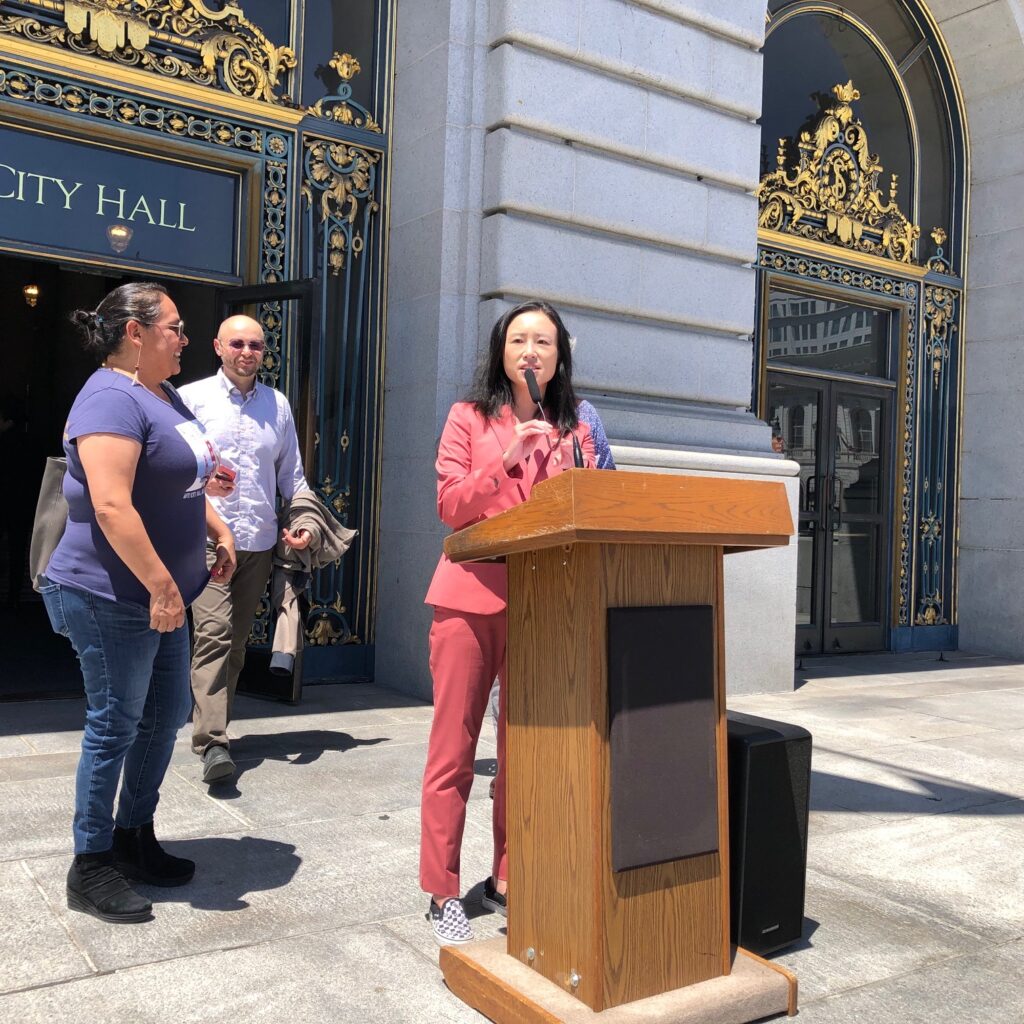The Board of Supes today eliminated single-family zoning in San Francisco, in a move that supporters agreed wouldn’t really do much good, and Sup. Shamann Walton said could do a lot of harm.
The vote was a close 6-4, with Sup. Connie Chan absent.
The most conservative supes opposed it because they said it didn’t do enough to make developers want to build; in includes, for example, a provision that new housing built in upzoned areas would have to be under rent control. And it included an anti-speculation clause that allows increased density only on lots that have been owned by the same person or people, or their relatives, for five years or more.

That provision is designed to prevent large corporations from buying up single-family homes, demolishing them and building apartments that won’t be affordable.
“If you support rent control, you should support this ordinance,” Sup. Dean Preston said.
Walton, on the other hand, said he is a big fan or rent control, but fears the new rules “will accelerate gentrification, obliterate present housing for families, and kill the fabric of our communities. There are too many obvious negative consequences.”
Mandelman, along with city planners, has been clear from the start that this probably won’t lead to a lot of new housing, much less affordable housing.
Voting in favor were Sups. Preston, Hillary Ronen, Rafael Mandelman (the author), Gordon Mar, Myrna Melgar, and Aaron Peskin. Voting No were Walton, Ahsha Safai, Catherine Stefani, and Matt Dorsey.
So that was one thing on the housing front. There is much more.
Sups. Preston and Ronen announced this morning that they’ve reached a deal with the Mayor’s Office on at least some moves to implement the voters will on Prop. I, the 2020 affordable-housing measure. From Preston’s Office:
The package includes a bond measure and direct investments from the budget process, totaling $114 million for affordable housing site acquisition, new construction, and life-safety repairs in existing affordable housing. Specifically, the bond measure includes: $40 million to acquire land for development of 100% affordable housing, $20 million for capital improvements/repairs to public housing and/or HUD subsidized co-ops, $12 million for affordable educator housing, and $10 million for elevator repairs at SROs.
The measure also includes $30 million for site acquisitions for the API Community, as part of Supervisor Connie Chan’s proposed API Equity Fund …Despite the increased Prop I funding intended for affordable housing, Mayor Breed’s FY22-24 draft budget included only a tiny fraction of the recommendations made by the Prop I oversight committee. In response, Supervisor Preston and housing advocates proposed the Social Housing Budget Package, consisting of Certificates of Participation, a long-term debt financing tool, and a budget request for the current fiscal year.
Working with Supervisor Preston, Budget Chair Hillary Ronen was able to come to an agreement with Mayor London Breed on the package after a lengthy negotiation late Monday evening.
The bond measure Preston is talking about is actually something called Certificates of Participation, which is a way the city can borrow money without a two-thirds vote of the people. So that money can be in the budget and allocated quickly.
The budget negotiations continue to move forward.
So do a pair a City Charter amendments addressing affordable housing—one from the Yimbys, who have signature-gatherers in the field right now, and one from Sups. Chan, Walton, and Peskin. That proposal will be heard at the Rules Committee Wednesday/29.
The folks with the Yimby petition are telling people it’s going to promote affordable housing and teacher housing (I saw one person make that claim today in front of my local grocery store).
But the numbers tell a different story.
The Yimby measure gives developers a big benefit—it would essentially end all public oversight of new housing—as long as the project includes additional “affordable” housing, which is defined as housing priced to meet the needs of people earning 140 percent of the area median income.
For a two-person household, that’s $149,000 a year, which means rent of $3,725 a month is “affordable.” The median rental for a one-bedroom apartment in San Francisco right now is $3,000, according to Zumper. (Thanks to SF Minute for the link). I’ve looked around at listings, and there are plenty of available one-bedroom apartments on the market for less than $3,725 a month.
Which means that the Yimby measure would give developers a huge windfall for building apartments that would rent for what they are going to be able to charge anyway. (Unless they build only high-end luxury units, which the city doesn’t need and shouldn’t approve anyway.)
Is it “teacher housing?” The entry-level salary for a San Francisco public-school teacher with a B.A. is $61,000 a year. After 13 years, it goes up to $72,000 (more if you have advanced studies). Two teachers will not make enough money to “afford” the $3,725 cost of the rental units that developers would get a huge bonus to build.
The measure the supes want to put on the ballot also would allow streamlined production of affordable housing—but the rules would be different.
Under that measure, “affordable” would cap out at 120 percent of median income, and that definition would be linked to the City Planning Code, which the supes could amend as needed. So if too many developers are pushing for too much higher-end housing, the board could change the rules and direct those benefits to housing for lower-income people.
The supes measure includes some clear language that explains the roots of the housing crisis:
There is a long history in California and San Francisco of racial covenants, banking practices, and zoning laws being used to maintain high real estate values and exclude immigrants, people of color, and low-income residents. Even after explicit racial covenants were outlawed, the combination of systemic exclusionary policies such as blockbusting, redlining, and zoning that maintained or increased land values were often used to legally segregate the nation’s housing stock by creating barriers for low-income communities and communities of color to enjoy certain housing opportunities and privileges. Their plight compounded by decades of disinvestment from public schools and infrastructure, and from the disparate impact of environmental racism, these same communities today bear the brunt of evictions, gentrification and displacement pressures, and are often the target for unrestricted market-rate luxury development that is unaffordable to them. Unlike more resourced neighborhoods, lower-income and BIPOC communities, after decades of disenfranchisement on development decisions that affect their neighborhoods, are still fighting to claim the right to community planning and self-determination.
Policies incentivizing increased development in any part of the City should also specifically preserve at-risk existing housing, which provides long-term stability to existing communities
The barriers to production in high-demand market areas are primarily high land costs, high construction costs, and heightened investor risk relating to the viability of large, high-density projects. Upzoning and streamlining housing in hot markets results in increased land values, which can exacerbate the instability of residents in those communities with increased market rate development and impact the ability of the City and affordable housing developers to compete for land.
It’s going to be confusing for the voters in the fall, but I think the supes can make the messaging clear: One measure is good for working families, and the other is good for developers.
Oh, and by the way: New housing construction in the city has fallen pretty dramatically over the past year—in large part because the cost of land and construction is soaring, and rents are not. From the Chron’s real-estate reporter, J.K. Dineen (who lives as reporters should, in the fact-based world):
Tens of thousands of approved units are languishing as the cost of building has outpaced revenues that can be generated through rents or sales. Rents in San Francisco are still 14% below what they were pre-pandemic, while construction costs have gone up.
Let’s look at that again. Developers are complaining about affordable-housing fees, as they do, but here’s the key fact:
Rents are lower than they were. So developers aren’t building.
That’s the fundamental flaw in the Yimby narrative, right there. The idea that allowing developers to build without limits will eventually lower rents fails to recognize how housing markets really work today. When rents come down, the capital that finances housing goes somewhere else.
And why have rents been softening? Because a lot of high-paid workers are leaving the city, since they don’t need to come into the office anymore.
Demand side, it appears, matters a lot more than supply side. Imagine that.





